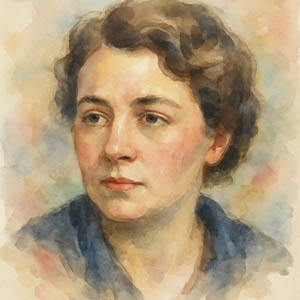 Celebrating the quiet joy of the world, poet Louise Marie Bogan (1897–1970) was born on this day in Livermore Falls, Maine. A student of Latin, she developed the skill to translate feelings into words with a formal grace that never lost its heart.
Celebrating the quiet joy of the world, poet Louise Marie Bogan (1897–1970) was born on this day in Livermore Falls, Maine. A student of Latin, she developed the skill to translate feelings into words with a formal grace that never lost its heart.
“True revolutions in art restore more than they destroy,” she said, writing as one who rebuilds, line by line.
A vibrant part of the New York City writing community, Bogan received three Guggenheim fellowships (1922, 1933, 1937) and published her first collection of poetry, Body of This Death (1923). Dark Summer (1929) and The Sleeping Fury (1937) followed, each a mirror of her precision and depth.
She once reflected, “What we suffer, what we endure, what we muff, what we kill, what we miss, what we are guilty of, is done by us, as individuals, in private.”
Inspired by the voices of William Butler Yeats and Rainer Maria Rilke, Bogan wrote with measured cadence and emotional clarity. A poet’s poet, she pursued perfection with unwavering excellence, writing with great control and lyricism that touched themes of love, language, identity, and death.
Her voice held nothing false. Her words radiated truth.
As poetry critic for The New Yorker for nearly four decades, Bogan lived with fierce passion and a profound need for solitude. “No woman should be shamefaced in attempting, through her work, to give back to the world a portion of its heart,” she believed... and did. Even when wrestling with silence, she chose joy.

